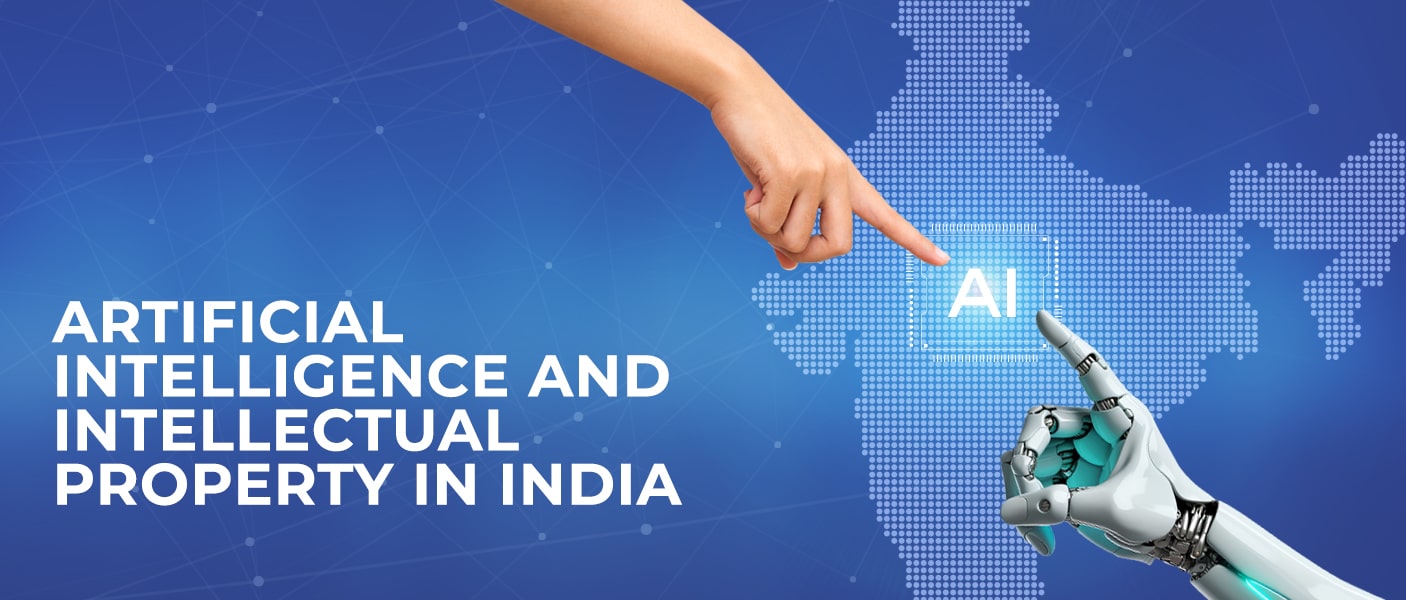Artificial Intelligence And Intellectual Property In India
September 30, 2024 By Khyati DaveArtificial Intelligence (AI) is rapidly transforming industries and economies across the globe. From healthcare and finance to manufacturing and education, AI is reshaping the way we live and work. However, as AI advances, it raises complex legal and ethical issues, particularly concerning Intellectual Property (IP).
In India, the intersection of Artificial Intelligence and Intellectual Property law is still evolving, and understanding the legal framework is essential for businesses, innovators, and policymakers.
This blog explores how AI and IP laws in India are adapting to these new challenges and opportunities while highlighting key legal issues in this evolving field.
What is Artificial Intelligence (AI)?
Artificial Intelligence refers to the simulation of human intelligence by machines, particularly computer systems. These systems are designed to perform tasks that typically require human intelligence, such as learning, reasoning, problem-solving, and understanding language. AI systems can analyze vast amounts of data, recognize patterns, make decisions, and even create new works, which brings them into the realm of intellectual property.
With AI now capable of creating works—whether in art, literature, or inventions—it brings into question the traditional frameworks of Intellectual Property Rights in India and globally.
Intellectual Property Rights in India: A Brief Overview
Intellectual Property Rights in India is designed to protect the creations of the mind, such as inventions, literary and artistic works, designs, and symbols. The primary forms of IP protection in India include:
Patents: Protects inventions and innovations that offer a new technical solution or significantly improve an existing process.
Copyright: Safeguards literary, artistic, and musical works from unauthorized use.
Trademarks: Protects brand identities, including logos, names, and slogans.
Designs: Protects the visual appearance of a product, including shape, configuration, and ornamentation.
AI and IP Laws in India: Key Legal Challenges
As Artificial Intelligence technology continues to evolve, it raises several questions regarding the existing IP framework in India. The primary challenges include authorship, ownership, patentability, and enforcement of Intellectual Property Rights in India.
1. Authorship and Ownership: Can AI Be an Inventor?
One of the biggest debates surrounding Artificial Intelligence and Intellectual Property law is whether AI-generated works can qualify for intellectual property protection. In India, as in most jurisdictions, the law generally recognizes human beings as the creators or inventors. The Indian Patent Act, for example, defines an "inventor" as a natural person. This raises a crucial question: if an AI system creates a new invention or artistic work, who owns the IP rights?
Current Legal Stance: Under current Indian law, AI itself cannot be recognized as an inventor or author. This means that the individual or organization that owns or controls the AI system is considered the creator of the work, even if the AI system plays a significant role in the creation process. This could lead to disputes over ownership, especially in collaborative AI-human projects.
Potential for Reform: As AI systems become more autonomous and creative, there may be a need for reform in IP laws to account for AI's role in the creation process. Some experts argue that AI-generated works should be considered for a new category of IP protection.
2. Patentability of AI-Generated Inventions
AI systems are increasingly being used to develop new products, drugs, and technologies. However, when it comes to patent protection, the question arises: can inventions created by AI be patented under Indian law?
Novelty and Inventive Step: To qualify for patent protection in India, an invention must meet the criteria of novelty, inventive step, and industrial applicability. AI-generated inventions can certainly meet these criteria, but the challenge lies in determining whether the "inventive step" can be attributed to a machine. Under current Indian law, only human beings can apply for patents, which excludes AI-generated inventions from patent eligibility.
The Role of AI in Patent Applications: AI is also being used to assist in the patent application process. For example, AI-powered tools can help identify prior art and assess the novelty of an invention. However, the use of AI in the patenting process does not alter the legal requirements for human inventorship.
3. Copyright Protection for AI-Generated Works
AI is increasingly being used to create literary, artistic, and musical works. For example, AI can generate articles, compose music, and create visual art. But can these works be protected under Indian copyright law?
Originality Requirement: Copyright protection in India is granted to works that are "original." In the context of AI-generated works, the key question is whether the work can be considered original if it is generated by a machine. Indian courts have not yet addressed this issue, but under current law, copyright protection is typically granted to works created by humans.
AI as a Tool: In cases where AI is used as a tool by a human creator, the human author retains the copyright. For example, if a musician uses AI software to compose a song, the musician would be considered the author of the song, even if the AI played a significant role in its creation.
4. Trademarks and AI: Brand Protection in the Digital Age
AI is also being used in the branding and marketing process. For example, AI can generate logos, slogans, and brand names. In India, trademarks protect brand identities, and the legal framework allows businesses to register trademarks to prevent unauthorized use.
AI-Generated Trademarks: While AI-generated trademarks are becoming more common, Indian law still requires a human applicant for trademark registration. This means that businesses using AI to create brand identities must ensure that the trademark is registered in the name of a natural person or legal entity.
AI in Trademark Enforcement: AI is also playing a role in trademark enforcement. For example, AI-powered systems can monitor the internet for potential trademark infringements, making it easier for businesses to protect their brand identity.
Opportunities for Businesses and Innovators
Despite the legal challenges, AI offers significant opportunities for businesses and innovators in India. By leveraging AI, businesses can:
Enhance Innovation: AI can accelerate the innovation process by generating new ideas, improving designs, and optimizing production processes.
Streamline IP Management: AI-powered tools can help businesses manage their IP portfolios more effectively by monitoring for potential infringements, identifying prior art, and assessing the novelty of inventions.
Explore New Markets: AI-generated products and services can open up new markets and revenue streams, particularly in industries like entertainment, healthcare, and manufacturing.
The Future of AI and IP Laws in India: What Lies Ahead?
As AI continues to evolve, the Indian legal system will need to adapt to address the unique challenges it presents. Some potential areas for reform include:
Recognizing AI's Role in Creation: Indian IP laws may need to be updated to recognize AI's role in the creation process, particularly in cases where AI systems are generating novel inventions or artistic works.
New Categories of IP Protection: India may consider creating new categories of IP protection specifically for AI-generated works, similar to the sui generis protections offered in other jurisdictions.
International Collaboration: As AI technology transcends borders, India will need to collaborate with other countries to develop international standards and guidelines for AI and IP.
Artificial Intelligence is transforming the landscape of intellectual property rights in India, posing both challenges and opportunities for businesses and innovators. While current IP laws in India are not fully equipped to handle the complexities of AI-generated works, the rapid pace of technological change is likely to prompt legal reforms in the coming years. For now, businesses and creators must navigate the existing legal framework and stay informed about developments in AI and IP law to protect their innovations and intellectual property effectively.





